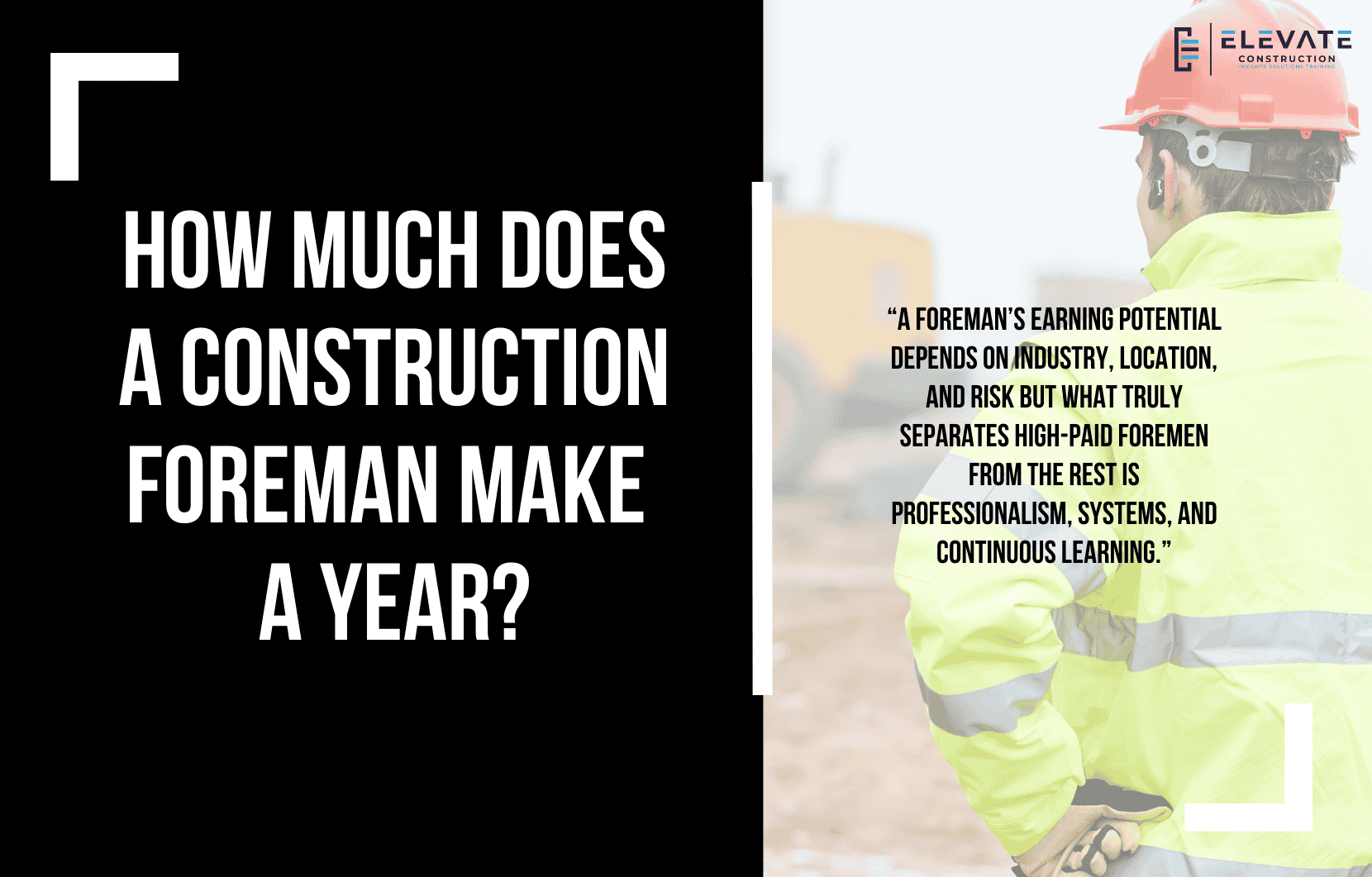How Much Does a Construction Foreman Make a Year?
How much does a construction foreman really make in a year? In this blog, I’m going to expound on some of the questions we’ve gotten from previous blogs. Don’t worry, this is all new content. I refuse to repeat, but I will answer fresh questions, and today we’ll dive into some really cool insights. We’ll also look at what separates low-paid foremen from high-paid foremen and I think you’re going to love it.
Helpful Resources
Before we jump in, let me share a few resources designed to support foremen in the field:
- Books: Elevating Construction Foreman, Elevating Construction Superintendents, Elevating Construction Senior Superintendents, Elevating Construction General Superintendents.
- Systems: Takt Planning, Elevating Pre-Construction Planning, Takt Steering and Control.
- Coming Soon: A pamphlet on the Last Planner System.
All of these are built with one goal: to deliver value to foremen. We love, love, love foremen, and everything we create is meant to elevate you.
Average Salary of a Foreman
So, what’s the average salary for a construction foreman?
Typically, when you combine an hourly rate with some overtime (usually based on a 48-hour workweek), you’ll see annual earnings fall between $70,000 and $120,000.
But the numbers don’t stop there:
- In California, salaries climb much higher.
- In the mines or oil rigs, pay can triple reaching $250,000, $300,000, or even $350,000. These high-risk environments demand higher pay, and foremen in those industries can make serious money.
Hourly vs. Salary Pay
Do foremen get paid hourly or by salary?
Most foremen are paid hourly, especially in union contexts. In fact, I’ve seen some superintendents who came up through foreman roles and still chose to remain hourly.
I remember one concrete foreman who had one of the best crews in the business. They were fast, efficient, and organized. This foreman negotiated such a high hourly rate, worked so much overtime, and made so much money that he refused to switch to salary. His value gave him leverage to create his own deal, a powerful reminder of what’s possible when you bring real results.
What’s Included in Total Compensation?
Foremen’s compensation packages vary depending on company size:
- Smaller companies (<50 employees): Salary may include everything, health insurance, dental, vision, and even housing or vehicle allowances.
- Larger companies: More structured packages with base salary, health insurance, dental/vision, bonuses, stock options, trucks, gas cards, iPads, and more.
The key takeaway: packages differ, but you should always evaluate the full range of benefits, not just the base salary.
How to Increase Your Value as a Foreman
Here’s the big one: How do you increase your value?
- Invest in yourself: Read books, attend training, learn people skills, and take certifications.
- Stay professional: Show up sharp, stay organized, and build strong relationships with your crew and leaders.
- Avoid stagnation: The stubborn, difficult-to-work-with foreman may survive, but they rarely advance.
The foreman who’s professional, constantly learning, and a great representative of the company? That’s the foreman who gets promoted.
Breaking Old Stereotypes
The construction industry has long embraced a “rough around the edges” stereotype: dirty trucks, no computers, yelling at workers, refusing to learn new systems. But this persona is outdated and even damaging.
The modern foreman needs to adopt a new identity:
“I am professional. I build things others can’t. I lead with knowledge, technology, and respect. I’m always learning and always adding value.”
This is the persona that earns trust, promotions, and long-term success.
Do You Need to Leave the Field to Earn More?
In many cases, yes. If you want to reach $260,000–$350,000 packages with a large general contractor, you’ll usually need to transition into roles like project manager or superintendent.
That said, if you add extraordinary value, you can negotiate unique deals without leaving the field. High performance creates leverage.
What Separates a $70K Foreman from a $120K Foreman?
The answer: processes, systems, and organization.
- $70K foreman: Haphazard, reactive, firefighting, figuring things out on the fly.
- $120K foreman: Planned, prepared, proactive, leading with structured systems and repeatable success.
That difference, discipline and organization is what sets top-performing foremen apart.
Key Takeaway
A foreman’s earning potential depends on industry, location, and risk but what truly separates high-paid foremen from the rest is professionalism, systems, and continuous learning.
If you want to learn more we have:
-Takt Virtual Training: (Click here)
-Check out our Youtube channel for more info: (Click here)
-Listen to the Elevate Construction podcast: (Click here)
-Check out our training programs and certifications: (Click here)
-The Takt Book: (Click here)
Discover Jason’s Expertise:
Meet Jason Schroeder, the driving force behind Elevate Construction IST. As the company’s owner and principal consultant, he’s dedicated to taking construction to new heights. With a wealth of industry experience, he’s crafted the Field Engineer Boot Camp and Superintendent Boot Camp – intensive training programs engineered to cultivate top-tier leaders capable of steering their teams towards success. Jason’s vision? To expand his training initiatives across the nation, empowering construction firms to soar to unprecedented levels of excellence.
On we go

